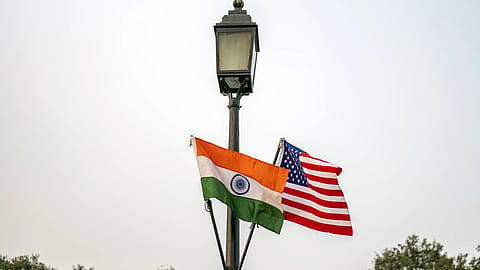US tariff to impact India; FTAs to secure long-term competitiveness: Finance Ministry
With global trade facing challenges, India's strategic FTA approach seeks to expand market access and maintain stability in a dynamic geopolitical and economic landscape, says the Finance Ministry

The Union Finance Ministry has said India will face an impact with the ongoing tariff impasse with the U.S., unless it is resolved soon. The ministry said India has signed two major trade agreements -- UK CETA and the India-EFTA TEP -- which will help ensure long-term competitiveness in the global trade landscape.
“Persistent shocks such as uncertainties related to tariffs, geopolitical tensions, and disruptions in supply chains have significantly impacted global trade dynamics. Despite these challenges, global trade has shown some resilience. Of course, it could be due to the frontloading of imports in anticipation of tariff deadlines as well as improvements in macroeconomic conditions. The adverse impact may be on its way,” the Ministry of Finance said in the Monthly Economic Report of July 2025.
“Given the importance of the U.S. market for India’s goods exports and the tariff rates that would apply to a significant portion of India’s merchandise exports to the United States, India would face effects, unless the uncertainty is resolved soon, resulting in lower duties,” the ministry said in the report.
“The global trade environment is undergoing significant changes. Geopolitics and economic nationalism dominate considerations of cost efficiency. This evolving landscape, characterised by preferential market access, punitive tariffs, and supply chain restructuring, is reshaping trade priorities and strategies. In this context, India has adopted a calibrated approach to negotiating free trade agreements (FTAs) to expand market access while protecting domestic interests,” the report said.
“Two major trade agreements have been recently concluded: the India-UK CETA and the India-EFTA TEPA. Further, there are ongoing negotiations with the EU, US, Peru, Chile, Oman and New Zealand. India’s calibrated engagements in FTAs reflect a strategic effort to secure long-term competitiveness in a dynamic global trade landscape,” the report added.
Citing WTO’s trade forecasts, the ministry said the world’s merchandise trade is projected to grow by 0.9% in 2025, significantly lower than the 2.7% estimate before the tariff increases. “It is pertinent to note that the effects of these tariffs are still emerging, and they are expected to have a dampening effect on trade in the latter half of 2025 and throughout 2026. At the same time, uncertainty reigns in the global trading environment. It has an ongoing impact on business confidence, investment and supply chains,” said the report.
“The Trade Policy Uncertainty Index, which had started to come down since its peak levels in April 2025, has increased by 17.4 per cent on a month-on-month basis in July 2025. The resilience of India’s external sector has been a key contributor to its stable macroeconomic environment amidst a global trade environment shaped by tariff adjustments and increased uncertainty,” said the ministry.